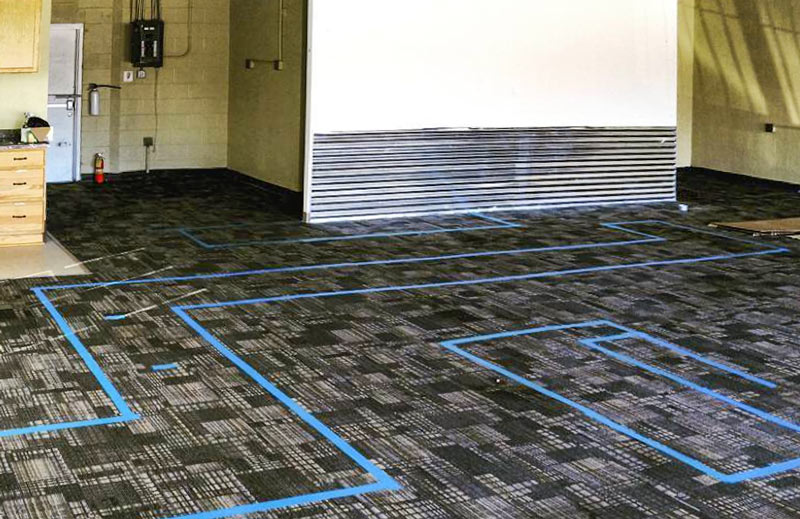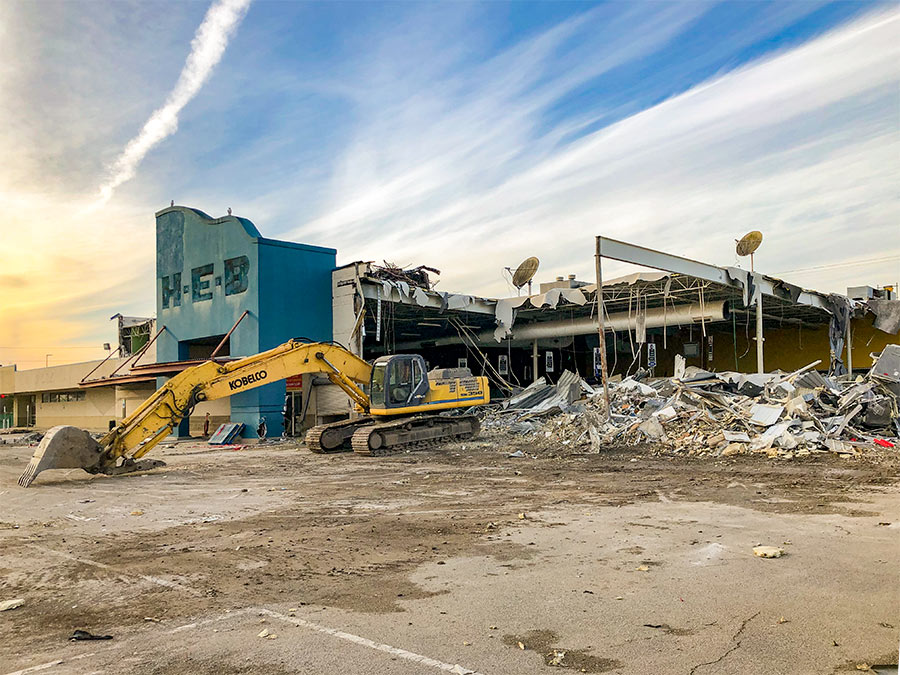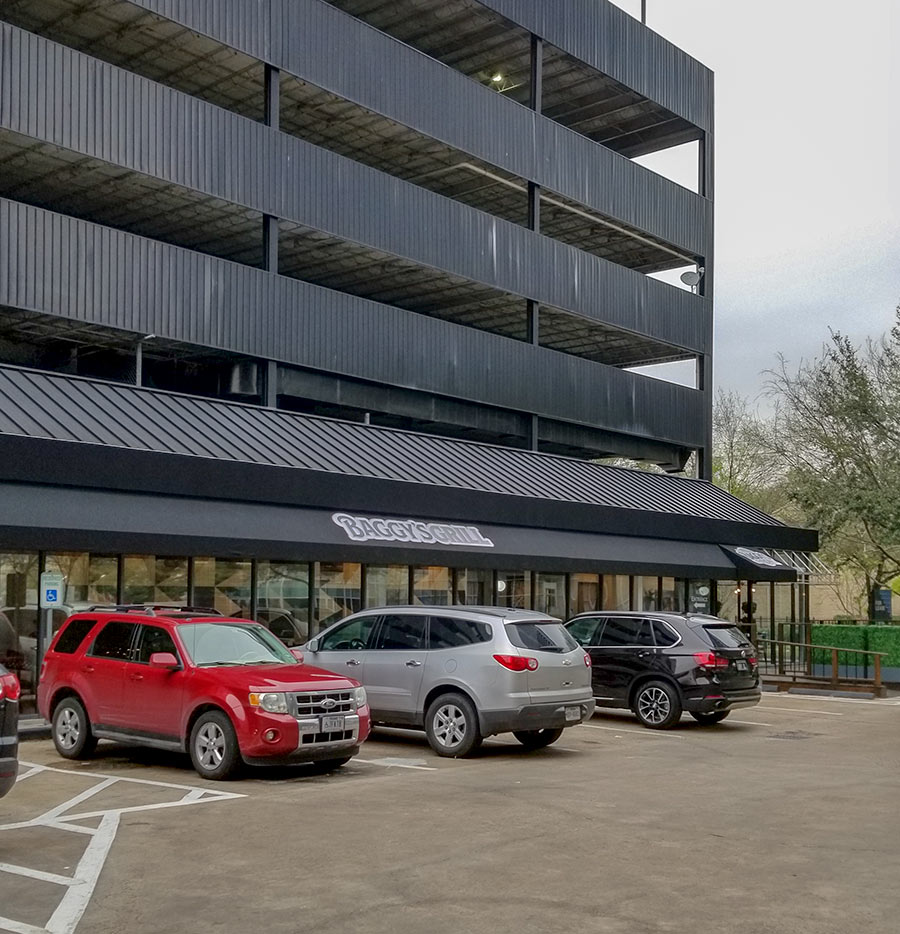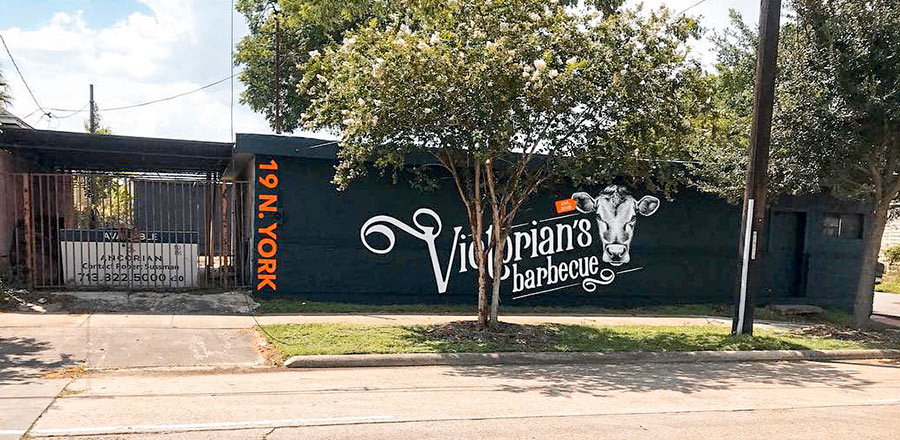
Remodeling is underway at the former Primary Purpose Alcoholics Anonymous meeting space, as Suite D of the strip center at 1203 W. 34th St. is converted into Slowpokes wine, beer, and coffee bar. The new business is busy building its digital presence as it rehabs its physical space just south of the corner with Alba Rd.
The bar’s Instagram page shows the above photo of a screenshot of a rendering of the suite under renovation, which depicts a large patio spreading out into what is currently the strip center’s parking lot. Photos of carpet removal and wishful floor-taping have also been posted as interior construction begins:
***

Adding to Houston’s growing list of TABC-licensed drink-while-you-launder coffee shops, Slowpokes will move in directly next to the Alba Washateria, itself in line with the Isabella Hair Salon and the Alba Food Mart down the row toward 34th. Across-the-street neighbors include the Pat H. Foley & Company funeral home and Houston Embalming Services, along with Texon Motors across Alba.
- Slowpokes [Instagram]
- Openings and Closings in Houston: Beaver’s Expands, Piqueo Rebrands [Houston Press]
Photos: Slowpokes





I wonder is Slowpokes is a reference to the adage of “One Day at a Time”?
former AA meeting location turned bar. The jokes are too easy :)
AA is for quitters!
—
But seriously, AA fails vast majority of the time because it’s based in religious dogma and not proven psychological research, even courts are starting to phase out AA for secular programs based in reality.
The washateria has already moved out.
@commonsense, Spoken just like someone that’s few drinks down.
Isnt Lutheran North caddy corner from this site. Well their sporting fields atleast.
A spot for parents of crappy athletes to watch the games.
AA doesn’t fail anyone. Addiction sucks and it’s hard. If AA has worked for millions of people as a way to escape addiction and rebuild their lives, what’s the harm? If you are saying that the false hope is the harm, what are the reliable options? From a dogmatic perspective, there is a quote that is appropriate for this… “‘There is a principle which is a bar against all information, which is proof against all arguments and which cannot fail to keep a man in everlasting ignorance—that principle is contempt prior to investigation.'” Herbert Spencer
Wow!! A comment from commonsense I actually agree with! First time for everything!
Commonsense, I’m not so sure the religious dogma is at fault. My experience with AAs is that the people who go are at varying levels of commitment to quit and includes many who are shaky at best. So you have people who really do want to quit but if exposed to temptation are not yet disciplined enough to say no and who are grouped with people who don’t need much motivation to drink or do their favorite drug. I have experienced the former get pulled back into their old habits by the latter several times. Ideally, anyone who goes to AA would do individual therapy first to prepare them for the issues/exposures of group work.
Dogma has little to do with whatever AA’s success rate may be (which is surprisingly difficult to determine, for a number of reasons). Addiction in general isn’t really all that well understood either. Radiolab did an episode some time ago (The Fix) that was a reasonably good discussion.
there really isn’t a “dogma” of aa because people end up believing whatever they want with an emphasis on practicality or whatever works for them. so an observer could see varying beliefs from atheist/agnostic or new age crap to those people who crave religiosity and dogma and like to preach or be preached to. aa doesn’t have central control of its own meetings. the groups do pretty much whatever they want with guidance and experience from the central office.
–
the meetings just provide a place for someone with a problem to find other people who are in recovery that are willing to share with them their experience on how they’ve stayed sober and learned how to get through life’s ups and downs without using drugs/alcohol. again, there’s an emphasis on practicality. the people who have experience show the new people the things that worked for them in the hopes that maybe it might work for them too. if there are other treatment options that work, then people are welcome to give them a shot. there may be some dogmatic assholes who act like aa is the only way, but the “official” aa position (even though i dont think there really is such a thing as the “official” aa position on anything) is that aa doesn’t have a monopoly on recovery and that they have an open mind that some other treatment option may come along in the future that is way better than aa and might make it unnecessary.
–
if this other more effective hypothetical treatment option arrives, then i assume people will naturally start doing that instead since aa is not particularly fun and people are always looking for an easier/better way to do things, and aa would naturally die out as people stop attending the meetings.
Guys guys, this article is about a coffee shop. Why all the negativity. Good luck SlowPokes!
I’ve seen AA work first hand with relatives who otherwise would still be drinking. It’s not a cure but a commitment with other people in recovery to stay sober.
I have no personal experience with AA but I think it is worth a try for those in need. As others have noted, one may knock the AA platform – but what other credible alternatives are there?
.
Addiction can be a self-sustaining cycle so any opportunity to break that cycle is worth it to someone (and their families). Live and let live.